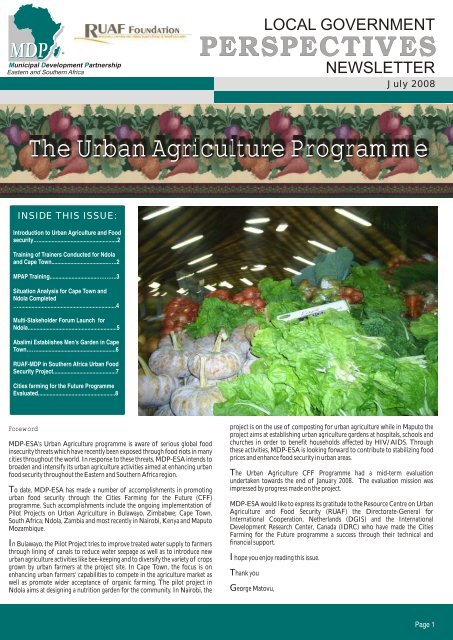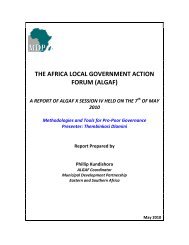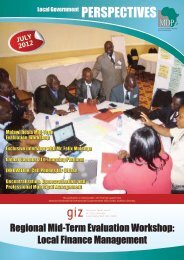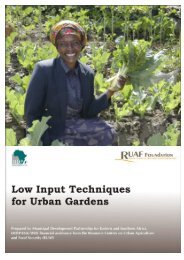The Urban Agriculture Programme - Municipal Development ...
The Urban Agriculture Programme - Municipal Development ...
The Urban Agriculture Programme - Municipal Development ...
- No tags were found...
You also want an ePaper? Increase the reach of your titles
YUMPU automatically turns print PDFs into web optimized ePapers that Google loves.
<strong>Municipal</strong> <strong>Development</strong>PartnershipEastern and Southern AfricaLOCAL GOVERNMENTPERSPECTIVESNEWSLETTERJuly 2008<strong>The</strong> <strong>Urban</strong> <strong>Agriculture</strong> <strong>Programme</strong>INSIDE THIS ISSUE:Introduction to <strong>Urban</strong> <strong>Agriculture</strong> and Foodsecurity…......................................................2Training of Trainers Conducted for Ndolaand Cape Town........................................….2MPAP Training.................................………..3Situation Analysis for Cape Town andNdola Completed…...................................................................4Multi-Stakeholder Forum Launch forNdola.............................................................5Abalimi Establishes Men's Garden in CapeTown……......................................................6RUAF-MDP in Southern Africa <strong>Urban</strong> FoodSecurity Project...........................................7Cities farming for the Future <strong>Programme</strong>Evaluated.....................................................8ForewordMDP-ESA's <strong>Urban</strong> <strong>Agriculture</strong> programme is aware of serious global foodinsecurity threats which have recently been exposed through food riots in manycities throughout the world. In response to these threats, MDP-ESA intends tobroaden and intensify its urban agriculture activities aimed at enhancing urbanfood security throughout the Eastern and Southern Africa region.To date, MDP-ESA has made a number of accomplishments in promotingurban food security through the Cities Farming for the Future (CFF)programme. Such accomplishments include the ongoing implementation ofPilot Projects on <strong>Urban</strong> <strong>Agriculture</strong> in Bulawayo, Zimbabwe; Cape Town,South Africa; Ndola, Zambia and most recently in Nairobi, Kenya and MaputoMozambique.In Bulawayo, the Pilot Project tries to improve treated water supply to farmersthrough lining of canals to reduce water seepage as well as to introduce newurban agriculture activities like bee-keeping and to diversify the variety of cropsgrown by urban farmers at the project site. In Cape Town, the focus is onenhancing urban farmers' capabilities to compete in the agriculture market aswell as promote wider acceptance of organic farming. <strong>The</strong> pilot project inNdola aims at designing a nutrition garden for the community. In Nairobi, theproject is on the use of composting for urban agriculture while in Maputo theproject aims at establishing urban agriculture gardens at hospitals, schools andchurches in order to benefit households affected by HIV/AIDS. Throughthese activities, MDP-ESA is looking forward to contribute to stabilizing foodprices and enhance food security in urban areas.<strong>The</strong> <strong>Urban</strong> <strong>Agriculture</strong> CFF <strong>Programme</strong> had a mid-term evaluationundertaken towards the end of January 2008. <strong>The</strong> evaluation mission wasimpressed by progress made on the project.MDP-ESA would like to express its gratitude to the Resource Centre on <strong>Urban</strong><strong>Agriculture</strong> and Food Security (RUAF) the Directorate-General forInternational Cooperation, Netherlands (DGIS) and the International<strong>Development</strong> Research Center, Canada (IDRC) who have made the CitiesFarming for the Future programme a success through their technical andfinancial support.I hope you enjoy reading this issue.Thank youGeorge Matovu,1Page 1Page 1
Introduction to <strong>Urban</strong> <strong>Agriculture</strong> and Food security good nutrition and good health through the provision ofsafe water and sanitation as well as other urban agriculture<strong>The</strong> <strong>Urban</strong> <strong>Agriculture</strong> <strong>Programme</strong> at MDP is aware of the related challenges.increasing food insecurity globally. <strong>The</strong> UN SecretaryGeneral has referred to global food crisis as a danger to <strong>The</strong> MDP UA programme is therefore preparing itself to upsocio-economic development. This food crisis usually scaling its reach to the region. <strong>The</strong> strategic objectives of theaffects the urban poor who now have to bear the high costs programme in response to this new thrust will be to:of procuring basic food. <strong>The</strong>ir rural counter parts are Raise awareness on the contribution of urbancovered as they can grow their own food. <strong>The</strong> urban pooragriculture to stabilizing food prices and enhancingusually do not have enough or no land at all to grow cheapfood securityfood. <strong>The</strong> recent food riots in different countries starting in Assist municipal authorities engage their stakeholderscities have re-stressed the need for the development ofin designing pro-poor and consultative urbaninterventions that respond to food security in general, andagriculture policies and strategiesurban food security in particular. Food riots and Develop the capacity of planning professionals indemonstrations have been experienced in Burkina Faso,planning for the sustainable integration of urbanEgypt, Haiti, Ivory Coast, South Africa Mexico and Yemen.agriculture in urban land use planningDisturbances have been felt in urban areas and urban Work with urban agriculture producer organizationsagriculture isin order topoised to tackledevelop theirsome of thesec a p a c i t y t op r o b l e m s b yo r g a n i z eensuring cheapthemselves sof o o d f o r t h ethat they areurban poor.better placedU r b a nt o t a p i n t ogovernmentalagriculture in thea n d n o n -cities and townsgovernmentalof the region hasresourcesbeen neglectedD e v e l o p t h eover the yearsc a p a c i t y o fand has beenm u n i c i p a lv i e w e d a s aauthorities andtrivial activity instakeholderst e r m s o f i t st o d e s i g ncontribution tou r b a nt h e u r b a na g r i c u l t u r eeconomy and tointerventionthe sustainables t r a t e g i e sParticipants at the T.O.T Workshop in Zambia in September 2007natural resourcesappropriatelyutilization and conservation. Despite all these hostilitiestargeted to address different sectors of society withand unclear policies and legislations, urban agriculture hasparticular emphasis on gender and otheralways been practiced in the backyards and open spacesdisadvantaged groupswithin our towns. Many households as observed by Raise more funds in order to reach out to at least doubleCabannes & Dubbeling have been engaging in subsistencemomentthe countries that the programme is working in at theoriented type of agriculture. <strong>The</strong>se are in the form of homegardens for home consumption, community gardens and Partner organizations working in the same area so thathospital nutrition gardens for feeding undernourishedwe can share both skills and other material resources toadults and children.the benefit of urban agricultureImproving the nutritional status of people is crucial in thecontext of HIV/AIDS as it strengthens the immune system,can delay the progression of the disease and makes itpossible for the individuals to remain productive. <strong>The</strong>challenge for the cities and towns is to support urbanagriculture in order to enhance food security, maintainTraining of Trainers Conducted for Ndola andCape TownTraining of Trainers (TOT) workshops under the CitiesFarming for the Future (CFF)programme were conducted in Ndola and Cape Town toPage 2
the techniques they had learnt.poultry management and technologies for UA. Otheractivities now relate to training the farmers in variousAt the end of the workshop, it was agreed to create working methods of managing water and techniques for growinggroups that would undertake some of the components of the various crops introduced. Work on lining the waterthe situation analysis. canal started end of February 2008.<strong>The</strong> Cape Town workshop was conducted from 5 to 9 <strong>The</strong> farmers have organized themselves into 17 groups forNovember 2007. This was timed to come after the purposes of easy coordination. <strong>The</strong>se make up the 120appointment of the Local Coordinator who benefited fromthe activity as well as assist in it. Key stakeholders such asthe City of Cape Town, Abalimi, Muslim Judicial Ccouncil,and different government departments were representedat the workshop. <strong>The</strong> Cape Town workshop was both a Farmers who are included in the pilot. <strong>The</strong>se are the firsttraining and planning workshop. It sought to achieve two 120 fields at the plantation.main objectives; the first objective was to develop theproject core team members' capacity to conduct the Cape Town Pilot Project to Focus on MarketSituation Analysis of urban agriculture in Phillipi; the Orientation and Organic Farmingsecond was to further develop the core group driving theMAP process in Cape Town by bringing them together and<strong>The</strong> pilot project for the City of Cape Town focuses onhelp in team building.enhancing farmers' capabilities to compete in theagriculture market as well as promote wider acceptance of<strong>The</strong> impact of the workshop was to create capacity toorganic farming. <strong>The</strong> multi-stakeholder group in the cityunderstand the MPAP process amongst a wider group ofagreed to support a pilot project proposal submitted by onestakeholder. It also created capacity for implementing theof the partners in the group, the Muslim Judicial CouncilSituation Analysis for Philipa-Fezuka area. Working teams(MJC). Key objectives of the proposal include trainingon the various aspects of the situation analysis werefarmers in order to enhance their capacity to produce forcreated.the market. This will be achieved through training them atthe MJC farm where the fourteen farmers will be exposedhands-on to crop growing and farm management.PILOT PROJECTS PROGRESSING WELLPilot projects embarked on in the three pilot cities ofBulawayo, Ndola and Cape Town and the disseminationcities of Maputo and Nairobi are progressing well.Bulawayo Gum Plantation Pilot Takes Shape<strong>The</strong> pilot project at the Gum Plantation inBulawayo seeks to improve treatedwaste water supply to the farmers at theplantation through lining the main canalto reduce losses through seepage. It alsoseeks to introduce new UA activities likebee-keeping and diversify the variety ofcrops at the plantation. Implementationof the pilot project started in October2007. <strong>The</strong> Gum Plantation Pilot ProjectSteering Committee was constituted.This comprises AREX, Chairperson ofthe Plantation, BCC, and SNV. <strong>The</strong>committee is responsible for the daytoday running of the plantation. Initialassessment of infrastructure at the sitehas been undertaken. Seed packs wereprocured for the farmers and landprepared. Farmers were trained invarious activities like horticulture,A key component of the training will be packaging andbranding for the market. This will enable the emergingfarmers' produce to compete with that of establishedfarmers in the tough competition for the market. <strong>The</strong> MJCare developing a packaging shade where the produce issorted as well as cold rooms to extend the shelf life of theproduce. <strong>The</strong> farmers will have the opportunity to<strong>The</strong> Cape Town MPAP team assesses the suitability of the MJC pilot project sitePage4
produce, pack, and brand their produce during training.<strong>The</strong>y will also be exposed to the market and even get ashare of the profit.Another key component of the pilotproject is the promotion of organic farming. This will bedone to achieve two strategic objectives. Firstly this is partof a global movement towards the promotion of healthyeating and improving the nutrition of the beneficiaries. <strong>The</strong>second purpose for promotion of organic farming is part ofa bigger objective to improve urban environmentalmanagement through the uptake of urban organic wastes.In Cape Town there are already other partners in the MPAPprocess who are promoting organic farming and theseshould help in the pilot project. Abalimi have establishedthemselves well in both organic farming and marketing oforganic produce. <strong>The</strong>ir harvest of hope project will be auseful ally of this pilot project.<strong>The</strong> other component of the pilot is the mentorshipprogramme that operates at two levels. An establishedfarmer has been identified who should mentor theemerging farmers by interacting with the farmers andteaching through positive peer influence. <strong>The</strong> emergingfarmers will be expected to share their experiences withfive subsistence farmers in the poor suburbs of Phillipi andKhayelitsha to increase the reach of the knowledge gainedon organic farming and the market.Ndola Nutrition Garden Established<strong>The</strong> pilot project at New Kaloko has been finalized.Activities started mid-March. <strong>The</strong> pilot is about designing anutrition garden for the community. Farmers have beentrained in community management and issues of nutrition.<strong>The</strong> Ndola Nutrition Group, a local community basedNGO, is implementing the project. <strong>The</strong> project involves 40members and will be replicated on land that has alreadybeen identified. <strong>The</strong> project intends to improve thenutrition uptake of malnourished children in theneighborhood. <strong>The</strong> main objectives of the project include: Reduce the rate of malnutrition in OVCs by 30% Participating 40 members to produce 70% of health andnutritious food like vegetables and poultry. Using manure raised from poultry in the garden forvegetable production Skills development for the 40 participating memberswho will apply the skills learnt in their own gardens. Making water available all year round to water thegardens. Reducing the cost of production by 30% as the organicmanure from poultry will be used in the gardens andexcess chicken manure will be sold.Pilot Projects to be identified under theCompetitive Bidding<strong>The</strong> first was the Nairobi Based <strong>Urban</strong> Farmers' Initiatives.<strong>The</strong> project is on the use of composting for urbanagriculture. <strong>The</strong> group of farmers involved in the projecthave been involved in farming for a long time. This projecthas been implemented since August 2007. It is located inthe Kasarani Ngumba area of Nairobi about 10 km from theNairobi project farmers with Charles Mbugua(coordinator) seatedCity centre along Thika Road. To date the project hasmanaged to buy bags for sorting the domestic waste andsome seed packs for the farmers. <strong>The</strong>y are in the process ofpurchasing a pump for irrigation.<strong>The</strong> other project is by the Youth for Community<strong>Development</strong> of Maputo. <strong>The</strong> project involves starting UAgardens at hospitals, schools and churches in the city inorder to benefit HIV affected households and otherdisadvantaged groups in the city. All stakeholders in thecity have recommended this project. Funds were releasedin August and activities are now being implementedaccording to agreed work plans. <strong>The</strong> project bought someseed packs and has installed some simple irrigationequipment at the sites where the project is taking place.Bulawayo Completes Revision of UA PolicyA new UA policy document encompassing the views of awide range of stakeholders has been produced. <strong>The</strong> UAStakeholder Forum and the city council have approved thedocument. <strong>The</strong> policy starts by defining UA and refers tosome weakness of the policy guidelines approved in 2000before providing policy guidelines on land, water, financeand livestock. This policy is much more comprehensivethan the 2000 guidelines.Bulawayo UA Strategic Agenda<strong>The</strong> bulawayou UA strategic agenda has been produced.<strong>The</strong> agenda highlights some of the activities to beundertaken by stakeholders. AREX for example is going tobe responsible for the training and capacity buildingPage 5
components. A workshop to review the agenda wasconducted from the 4-5th of September, where a committeewas selected to finalize the agenda. <strong>The</strong> current agendatakes into account the concerns of all stakeholders. <strong>The</strong>agenda identifies action plans for the key priority areas of: Land Legal and Policy matters Water Finance Capacity development MarketingIn fact the revised policy is a result of the effort of theworking group on Policy and Legal Issues whichprioritized the revision of the UA policy as its mostimportant activity. Other working groups areimplementing various aspects of the Strategic Agenda.Situation Analysis for Cape Town and NdolaCompleted<strong>The</strong> situation analysis for the cities of Cape Town andNdola has been completed. <strong>The</strong> analysis sets the baselineconditions for UA in the cities and will be used indeveloping the UA strategic agendas for the two cities. <strong>The</strong>analysis covered the following aspects:Farming SystemsExisting InformationPolicy and Legislation Analysis,Land use Mapping,Stakeholder Analysis.<strong>The</strong> analysis was done by members of the core team in eachof the two cities who formed teams on the basis of thecomponents of the analysis as outlined above. Results ofthe analysis where presented and discussed at Validationworkshops in the two cities. <strong>The</strong> Ndola ValidationWorkshop was conducted on the 15th of April whilst theCape Town one was one week later. Major issues raised bythe report e.g. available land, by-laws, and water issueswere discussed. <strong>The</strong> reports are being finalized andsummaries or policy narratives will be produced and thesewill be used for the development of the UA strategicagendas for the two cities.From left: Mr. Chanda Deputy Mayor, Mrs Kristafor District Commissioner andMs. Sinkala Director of Social ServicesHeifer International, Zambia National Farmers Union,Central Statistical Office, Kafubu water, Twapia, ChifubuProjects, Panner Seeds, Ministry of Education, DistrictHealth and NDCU. <strong>The</strong> others were came from the usualorganizations who had been attending UA activities beforeMinistry of <strong>Agriculture</strong>, Social Welfare, Care International,Rainbow, Departments of City Council, Lands, NdolaNutrition, and Catholic Diocese. At the launch terms ofreference for the forum were discussed. Mr. Munsanje waselected the chairperson of the Forum. <strong>The</strong> first meeting ofthe forum was held on the 14th of December.Abalimi Establishes Men's Garden in Cape TownOne of the stakeholders in the Cape Town multi-actorpolicy making and action planning process (MPAP) hasestablished a community garden for men. <strong>The</strong> men onlygarden was visited by a member of the RUAF-MDPregional staff recently and was an 'eye-opener'. Most of thecommunity gardens in Cape Town are run by women withvery few men participating.Multi-Stakeholder Forum Launch for Ndola<strong>The</strong> launch of the stakeholder forum was done on the 29thof November at a colourful ceremony presided over by theNdola District Commissioner, Mrs Glays Kristafor and theDeputy Mayor Mr. Charles Chinala. 32 people drawn fromvarious organizations in Ndola attended the launch. <strong>The</strong>seincluded Zambia Electricity Supply Company (ZESCO),<strong>The</strong> 'men's garden' in Cape Town. Here visitors from England talk to the men who farmat the garden.Page 6
Rob Small of Abalimi explained that the men's garden had project's Research Working Committee meeting at thebeen established as an idea of the women in Abalimi. It University of Cape Town from 3 to 6 March. <strong>The</strong> sameappears men were failing to gel well with their female meeting also hosted a cocktail to launch PUFS. <strong>The</strong> head ofcounterparts in community gardens resulting in women the Environmental and Geographical Studies, Professorsuggesting that men work alone. <strong>The</strong> idea appears to have Jonathan Crush, and Percy Toriro were asked to address theworked as the men's commitment was observed to be now as stakeholders at the launch. Percy took the opportunity tohigh as one finds in the women's gardens.share with colleagues the RUAF-MDP work in the region aswell as the general work that MDP-ESA has done over the<strong>The</strong> men are also happy with the return they are getting out years. Other partners who did not know of the work MDPof the venture:and RUAF have done and are doing in the region developed'We are realizing enough to survive and look after interest and were encouraged to log onto our website.ourselves decently', one of the group members said. <strong>The</strong> PUFS will conduct research leading to policyintervention and capacity building in eleven cities in<strong>The</strong> men's garden in Khayelitsha, Cape Town is an Southern Africa namely, Gaborone (Botswana), Lesothoencouraging dimension of gender dynamics in Cape Town. (Maseru), Blantyre (Malawi), Maputo (Mozambique),Whilst it is too early to judge whether it will be sustainable, it Windhoek (Namibia), Cape Town, Durban, Johannesburgis an encouraging development in an area where urban (South Africa), Manzini (Swaziland), Lusaka (Zambia), andagriculture is mainly seen as a woman's activity.Harare (Zimbabwe). Percy will also be a member of thecountry research team in Zimbabwe.RUAF-MDP in Southern Africa <strong>Urban</strong> FoodSecurity Project<strong>The</strong> RUAF-MDP team has been invited to participate in aSouthern Africa project on urban food security (PUFS). <strong>The</strong>team was identified as a key organization working withlocal authorities in sub-Saharan Africa in the area of foodsecurity through its urban agriculture and other municipalcapacity building projects. Two MDP members of staff havebeen incorporated into the different committees of theproject.<strong>The</strong> Regional Director, Mr George Matovu has beenappointed to the project's Advisory Committee that isresponsible for monitoring and overseeing the project'sprogress and offering relevant guidance. Percy Toriro hasbeen appointed to the project's Capacity BuildingCommittee. Percy was recently invited to participate at the<strong>The</strong> project has already led to a breakthrough in one areawhere the RUAF Cff project had not been successful ingetting the cooperation and participation of a universitypartner in the Cape Town project. As a result of the PUFSlinks, the University of Cape Town will now do the impactmonitoring of the city pilot project.Cities farming for the Future <strong>Programme</strong> Evaluated<strong>The</strong> MDPESA-RUAF Cities Farming for the Futureprogramme was host to an evaluation mission from RUAF.Dr Margaret Parsquini conducted the evaluation on theBulawayo project and the overall regional programme inJanuary. Three members of staff of MDPESA who areinvolved in the programme participated in the evaluationmission. <strong>The</strong>se comprised the Coordinator, TakawiraMubvami, the MPAP Training Officer, Percy Toriro, and theKnowledge Management Officer, Phillip Kundishora.Dr Parsquini is shown around the project site by the Local Coordinator (left), and farmers discuss with the evaluator (right)Page 7
<strong>The</strong> weeklong exercise involved staff meetings with the (i) Overall, MDPESA made very good progress over theevaluator, meetings with council staff and policy makers, as last years in terms of consolidating themselves aswell as meetings with stakeholders. From the Bulawayo Regional resource Centres gaining a high level ofCity Council staff, Job Ndebele led the team that met the legitimacy and recognition by key institutions at global,evaluator whilst the forum chairman, Councillor Sibanda, regional, national and municipal level.represented the forum. Dr Parsquini also had theopportunity to meet the then Mayor of the city, Japhet (ii) One of the key contributions of the CFF program hasNdabeni A Partnership Ncube. Enabling Local Government Capacity been its impressive capacity to build multi-stakeholderenabling committees and multi-stakeholders forums<strong>The</strong> mission also included field visits to see progress on the for action planning, which are clearly contributing toground. <strong>The</strong> evaluator was taken to the main pilot project building participatory local governance, where thesite at Gum Plantation where she met and talked to the various actors, including the urban farmers have abeneficiaries of the project. <strong>The</strong> farmers shared their voice.challenges as well as their successes. <strong>The</strong> field visits also (iii) <strong>The</strong> pilot project in Bulawayo was on target and all theincluded a tour of partners' projects that started as a result of farmers were excited about it.the MDP-initiated multi-stakeholder approach to policymaking and action planning in urban agriculture. One (iv) <strong>The</strong> MDPESA has made positive progress with regardspartner, World Vision, has since drilled 42 boreholes and to developing and delivering various approaches forsupported the establishment of community gardens. <strong>The</strong> capacity building in UA to a wide range of stakeholders.Institute of Water and Sanitation who are involved as a <strong>The</strong>se activities have contributed attitude changes ofwater quality expert partner on the project, also participated urban actors towards UA, have put UA high on the localin the evaluation.agenda in the regions.<strong>The</strong> evaluator also attended a session of the core team of theproject in order to understand how they operate and meetthe team. She got a feel of the healthy team dynamics as thestakeholders freely interacted and sought explanationswhere they felt things were not moving smoothly. <strong>The</strong>mission ended with the evaluator making comments basedon her observations of the project. <strong>The</strong> comments were wellreceived by the MDP team who saw the comments asadding value to their work.On the regional programme, the evaluation mission notedthat the programme was on target in terms of meeting itsobjectives. <strong>The</strong>se include:(v) Several knowledge products have been producedlargely targeted at farmers. <strong>The</strong>se are the manuals onMushroom Production, Low-input Gardening,Technologies for UA, and Herbs for <strong>Urban</strong> Gardens.(vi) A policy has been developed for Bulawayo<strong>The</strong> mission noted that gender mainstreaming still laggedbehind.Page 8
A Partnership Enabling Local Government CapacityFor More Information Contact:Takawira Mubvami<strong>Urban</strong> <strong>Agriculture</strong> <strong>Programme</strong> ProjectCoordinatortmubvami@mdpafrica.org.zwPhillip KundishoraKnowledge Management Officerpkundishora@mdpafrica.org.zwPercy ToriroMPAP Training Officer‘ptoriro@mdpafrica.org.zwPublished by MDP Eastern and Southern Africa, 7th Floor Hurudza House, 14-16 Nelson Mandela Avenue, Harare, Zimbabwe,Tel: 263-4-774385/6, 724356-7, Fax: 263-4-774387, Email: gmatovu@mdpafrica.org.zw or region@mdpafrica.org.zwPage 9





